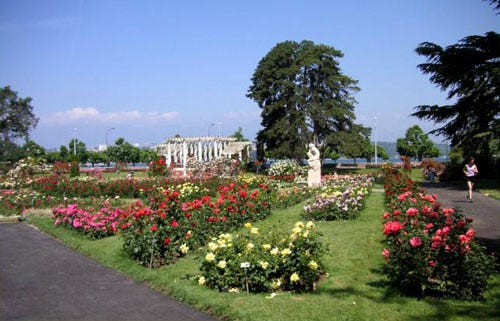On April 1st, 1941, the Musils moved to their last home in Geneva. It was on the Chemin des Clochettes in the Champel district, a few steps from the foot of the Saleve, blessedly quiet, but lonely.[i] A few days later, Robert wrote to Fritz Wotruba that Champel was “even prettier than in Chêne Bougeries, and the air and the quiet” were deliciously rural. Amazingly enough, the area where they lived was under a “quiet easement”; even the roosters, he wrote (most likely an exaggeration), were not permitted to crow and only emitted strange low sounds: “the poor creatures” had been forced to undergo an operation that took away their manly tenors.[ii] The “little house” had “light and shadow sides.” Martha provided a thorough description in a letter to Annina: The rooms were small, and for Robert that took some getting used to after his voluminous study in the Pouponniere. But the bathroom was large and modern: the boiler warmed the water in the whole place. On the first floor: kitchen, bedroom, and dining or living room (they ate in the kitchen most of the time); second floor: bathroom and two attic rooms, one of which Robert made into his study: his desk in the middle and a very comfortable armchair; a bookshelf behind and beneath a window another large work table; and a recliner as well—so crammed full that walking about was difficult. They were always going up and down the stairs, needing something that was on another floor, which Martha found quite fun and good for the figure—she had already lost some weight—and it was also good for Robert’s health. The owners, who had a larger villa on the same piece of land, were very nice and the old man worked the whole day in the garden, which was very beautiful and well-cared for, “very different from the one at the Grangettes, that was overgrown like in a fairytale.” The only problem was that their boiler and oven for the central heating system would require a great deal of expensive coal come winter. [iii]
Another chill, if they even knew about it: on April 15th, all of Musil’s works were entered into the 1941 list of “Harmfull and Undesirable Writings”.
Musil wrote with his usual blend of cheerfullness and chagrin to the Churches on May 4th, saying they were living “like Romeo and Juliette in a puppet theater....all alone in a ‘tower-like’ building that contains four doll-sized rooms, a doll-sized kitchen and a strangely out-of-proportion bathtub that reminds one of swimming on one’s back, because one sees the blue sky through the roof, and the white clouds, that are very white.” If one forgot one’s socks, one had to climb down a flight of stairs and when one got back up again, one had to go back down two flights to the entrance, where the missing slipper probably could be found. The place was really quiet—due to the “cruelly-elegant” practice of operating on the roosters’ vocal chords—and the nearby streets were “with great symbolism,” called Bout du monde and Le grand fin. He bid his friends to send him word from the larger world of Princeton, into the Musil’s “microscopic”one. Perhaps one was slowly readying oneself—with so much world-weariness—"to become an angel and to only hear life over the radio”....or was it perhaps worthwhile to try to return to life again, by joining the Hexners in the United states, “if one has already found such peace”? As to the roosters, Musil referred to Nietzsche’s quip that all elegance was cruel; but he himself loved this exceptional state of Geneva, since all the rest of the world was overtaken by “loudspeakers and thought-disturbers”. Yet even in this near-paradise of aesthetic respect for the creation of artistic work, decadence was creeping in due to the moral justification that “the edible is the foundation of all higher values”: a large portion of the beautiful Grange Park had been turned into a potato field. Soon to be followed by the Bertrand Park. Martha’s postscript to this letter: “We have barely a single acquaintance here in Geneva. Everyone has emigrated.” Her daughter was in Philadelphia; her son in Rome, and “my ingenious husband is in Utopia.”
(Parc La Grange, without potato field)
[i] B II 671. A few steps away from he foot of the Saleve (En Face, Lejeune, 420).
[ii] RM to Wotruba, April 3, 1941
[iii] MM to Annina, April 13, 1941





It all comes back. I remember my last home in Geneva & compare with that of the Musil memories... Champel had a huge hill called la rue du bout du monde, as he describes, and we used to ride our bikes down it to what he refers to as potato fields and we knew rather as playing fields.
My brother might have tried baseball there, but we were young and liked more to explore. The bike trip towards Conches & the Salève was far so we usually just went back up the big hill to get home to Florissant.
Also the reference to Park Bertrand is a place-name of meaning as that was the name of the park & primary school I went to.
Many properties had more than one house as I picture it- a main house of masonry and a wooden house, sometimes with separate apartments.
We too had a coal furnace, a russian stove, and a large storage tank on the third floor
for water.
The ramoneur came by bike with all the black chimney brushes across his back, and the vacuum man came on an electric bike.
Musil's attic studio would have been my older brother's airplane workshop!
The woodlands were our Utopia.